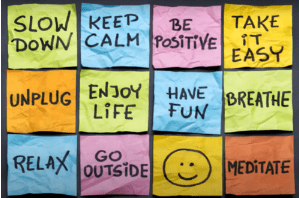How to Avoid Burnout as a Graduate Student
Author: April Fievoli

Now that the first two months of the academic year have come and gone, the realities of being a graduate student and the feeling of academic burnout can begin to manifest into a baseline state of stress and fatigue. Academia is a field where the divide between work and personal life can become blurry and we can end up feeling exhausted, not just mentally, but also emotionally and physically. Interestingly, burnout does not just affect us at a surface level, but it can affect us on a neurobiological level as well. Indeed, studies have highlighted links between burnout and changes in cognitive functioning, emotional regulation, and brain volume1–3. Acknowledging and addressing burnout is important, since when we take care of ourselves at the physical and mental level, we are better equipped to fulfill responsibilities within our academic and personal lives as well. With all that said, this is a good opportunity to take a minute to discuss the science behind academic burnout, as well as some tips on how to avoid it.
There are a host of studies investigating the effects of academic and workplace burnout on the brain. One of these investigated associations between burnout and attentional difficulties and found that the level of reported burnout was related to decreased performance on attentional tasks1. When we are unable to keep our minds focused on our daily tasks, it can negatively impact our productivity and ability to catch important pieces of information we are presented with, such as upcoming deadlines or meetings. Another study investigating participants suffering from chronic work-related stress found that functional connectivity between stress- and emotion-processing limbic networks were altered compared to healthy controls, and that this was associated with a decline in the ability to down-regulate responses to emotional stressors2. When we are unable to properly respond to these emotional stressors, this may in turn further contribute to the stressed-out state we are already experiencing. Lastly, one study investigating whether chronic occupational stress is associated with changes in brain structure found an increase in amygdala volume and a decrease in caudate volume in stressed participants, which were associated with impairments in stress perception and fine motor function, respectively3. Our ability to appraise a stressor determines how well we are able to cope with stressful situations, but when we are experiencing burnout, we are unable to do so as effectively. Impairments in fine motor function also impact our manipulative dexterity, speed, and visual-motor coordination3, all of which are important for carrying out our daily tasks. Taken together, burnout impacts us on a deeper physiological level which in turn can have negative effects on our daily performance and cognition.
The literature highlights the importance of managing burnout so that we can avoid some of the negative consequences that come with these neurobiological changes. Here are a few ways we can try to avoid burnout as grad students and seek wellness throughout our graduate studies (Academic Positions, 2019):
1. Find a Positive Outlet – Try finding something non-research related and let yourself be distracted by it for a couple hours. Whether that is through organized activities, such as extracurriculars or fitness classes, or via less formal activities like spending time with friends or family, giving yourself a mental break from your work can enable you to come back refreshed and clear-minded. BrainWaves is always looking for more people to join our team, so if you feel that this may be a good positive outlet for you, please do not hesitate to reach out!
2. Set Working Hours – Working in academia, it is easy to let yourself work during times you normally would not expect to be working. At the beginning of the week, try planning what days and what times you will do your work. Whether this is early in the morning or late at night, just be sure to segment time for not only your research-related tasks, but also for your self-care (breaks!) and sleep.
3. Change your Surroundings – With the onset of the pandemic, most of us have gotten accustomed to staying in the same place for days on end. It can be important to have a change of scenery so that you can have a break from your regular routine and potentially inspire new ideas. If restrictions allow, try going to a new coffee shop or a study spot on campus. Even something as simple as rearranging your workspace or moving to a different location in your home can help give you a break from the norm.
4. Establish a Support Network/Community – In graduate school, it is important to remember that you are never alone. Having a support system, whether that is in your academic life, personal life, or both, are important so that you have people to reach out to, whether it be about personal or research-related issues. Attending graduate events, such as writing workshops, or reaching out to some friends to reconnect, can help you create a positive network of people who are willing to support you both academically and personally.
5. Take Care of Yourself – It is easy to forget to take care of ourselves when we are completely consumed by our work, sacrificing sleep and eating well to get everything done. Yet, nutrition and rest are essential for having a healthy mind and body and can optimize our productivity. One recommendation is to take an hour or two at the beginning of your week to plan out your meals, saving yourself from having to worry about it later. Try to avoid doing your work right up until you sleep – maybe try reading a couple chapters of a non-research related book or watching an episode or two of your current show. Additionally, allocate one night every week to let yourself do whatever you want, completely unrelated to your research – this gives you a well-deserved mental break from your work and has you feeling refreshed when you come back to it.

As graduate students, it is easy to get caught up in the world of academia and forget to take care of our health and well-being. It is tempting to get as much work done as possible, but when we are on the verge of burnout, we will be unable to perform to the best of our ability. Implementing some of the above tips can help you combat burnout and to excel. If you think that you maybe are struggling with something more serious than academic burnout, you can seek professional support. McMaster has many mental health services, including:
Crisis Support: https://wellness.mcmaster.ca/crisis-support/
Counselling: https://wellness.mcmaster.ca/services/counselling/
Other Non-Urgent Mental Health Services: https://wellness.mcmaster.ca/resources/
References
1. Linden, D. V. D., Keijsers, G. P. J., Eling, P. & Schaijk, R. V. Work stress and attentional difficulties: An initial study on burnout and cognitive failures. Work Stress 19, 23–36 (2005).
2. Golkar, A. et al. The Influence of Work-Related Chronic Stress on the Regulation of Emotion and on Functional Connectivity in the Brain. PLOS ONE 9, e104550 (2014).
3. Savic, I. Structural Changes of the Brain in Relation to Occupational Stress. Cereb. Cortex 25, 1554–1564 (2015).